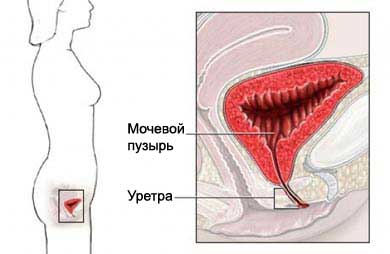The treatment of urinary incontinence – Transvaginal surgery
Description transvaginal surgery treatment of urinary incontinence
Stress incontinence is one of the many causes of uncontrolled urinary incontinence. The operation of “suspension” urethra is designed to help in the treatment of urinary incontinence in women.
Urinary incontinence is most often caused by weakening of the pelvic floor muscles, that support the bladder. The reasons for the weakening of muscles can be:
- Pregnancy;
- Delivery;
- Menopause;
- Previous pelvic surgery;
- Lack of physical activity.

Reasons for transvaginal surgery treatment of urinary incontinence
The goal of surgery is to further support the urethra, that gives more resistance to leakage of urine. This will stop the uncontrolled urination.
Possible complications of transvaginal surgery treatment of urinary incontinence
Complications are rare, but the procedure does not guarantee the absence of risk. If you plan the treatment of urinary incontinence, you need to know about possible complications, which may include:
- Bleeding;
- Infection;
- Reaction to anesthesia;
- Inability to urinate;
- Continued incontinence or recurrence of the problem;
- Damage to other nearby organs or blood vessels;
- Pain (eg, during sexual intercourse).
Factors, that may increase the risk of complications include:
- Smoking;
How is the transvaginal surgery treatment of urinary incontinence?
Preparation for the procedure
The doctor will try to find out, Why is leaking urine, assigning all or some of the tests:
- The study of medical history and drug information, Diseases, number of pregnancies, and previous surgeries;
- Urine, to determine the presence of infection or other problems;
- Inspection – It includes rectal and vaginal examination;
- To evaluate bladder function may be assigned additional procedures, such as:
- Urodynamic testing (Study diuresis) – established a temporary catheter to study bladder function;
- Cystoscopy – procedure for investigating the interior of the bladder.
On the eve of the operation:
- Tell your doctor about taking any medications. A week before surgery, perhaps, you need to stop taking certain drugs:
- Aspirin or other anti-inflammatory drugs;
- Blood thinners, such as warfarin;
- Clopidogrel (Plaviks);
- We need to organize a trip home from the hospital;
- Do not eat or drink the night before surgery.
Anesthesia
It may be used spinalynaya anesthesia, to numb the lower body. Sometimes applies general anesthesia, in this case during the operation you will sleep.
Description transvaginal surgery treatment of urinary incontinence
This procedure is performed through the vagina. Near the neck of the bladder and urethra are stitched, from which strands are then attached to the abdominal wall or pelvis. It will provide support to the bladder, putting it back into its normal position.
Immediately after transvaginal surgery “suspension” urethra
After surgery, you will be directed to the recovery room. To drain urine catheters.
How long will transvaginal operation “suspension” urethra?
1-1,5 hours.
Transvaginal operation “suspension” urethra – Will it hurt?
Anesthesia will block pain during surgery. After surgery, you may experience pain or soreness. Doctor will prescribe pain medicine, to reduce discomfort.
The average time of stay in the hospital after transvaginal surgery “suspension” urethra
You may be sent home the day of surgery.
Keeping the postoperative period after transvaginal surgery “suspension” urethra
In the hospital
At first the urine may be reddish in color, in connection with the release of blood. It will take place for some time. When you are able to urinate normally, the catheter is removed. You can start walking the day of surgery.
Home Care
Avoid heavy lifting and strenuous exercise for six weeks after surgery. This will speed up recovery. Ask the doctor, when it is safe to shower, bath or expose the surgical site to water.
To ensure proper recovery, follow your doctor's instructions.
Contact your doctor after transvaginal surgery “suspension” urethra
After discharge from the hospital need to see a doctor, if there was any of the following symptoms of:
- Signs of infection, including fever and chills;
- Redness, edema, strong pain, bleeding or discharge from the incision;
- Pain, which does not pass after taking pain medication appointed;
- Cough, shortness of breath or chest pain;
- Severe nausea and vomiting;
- Problems with urination;
- Pain, burning, frequent urination.
